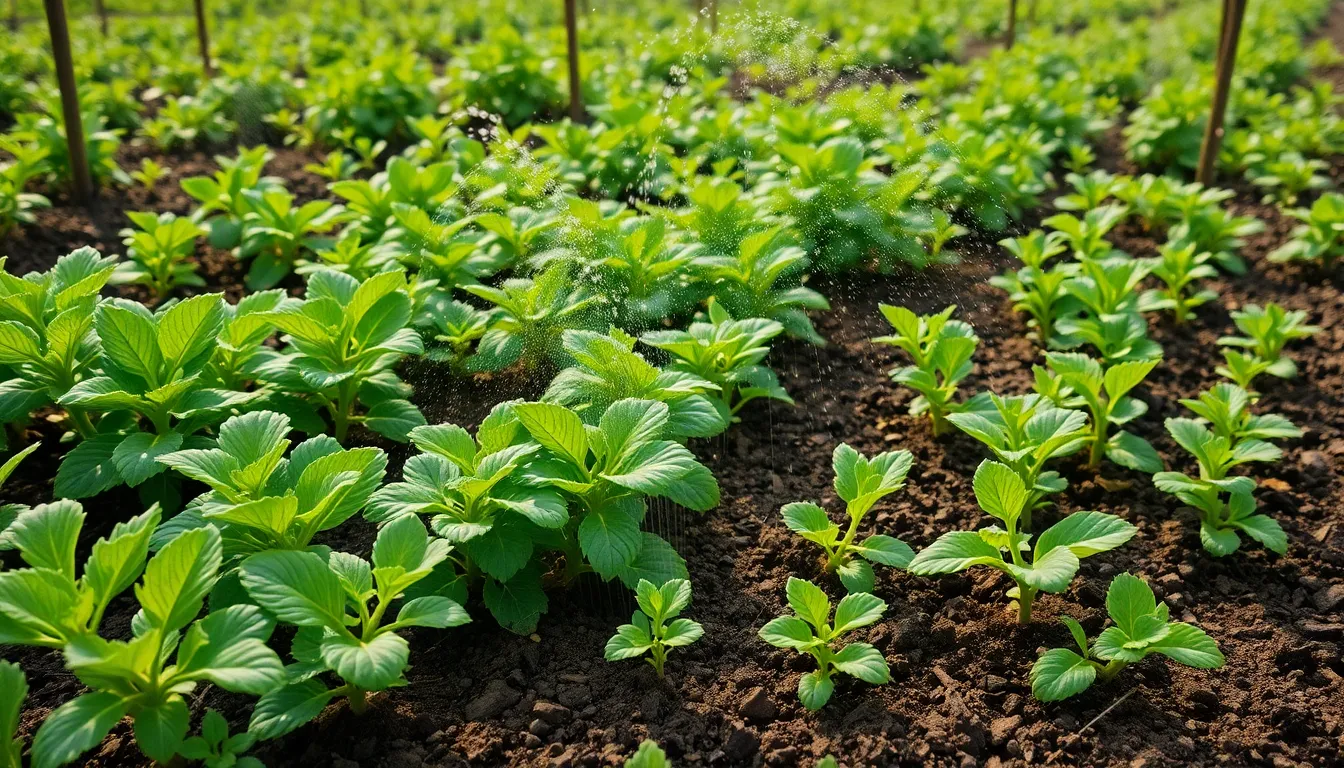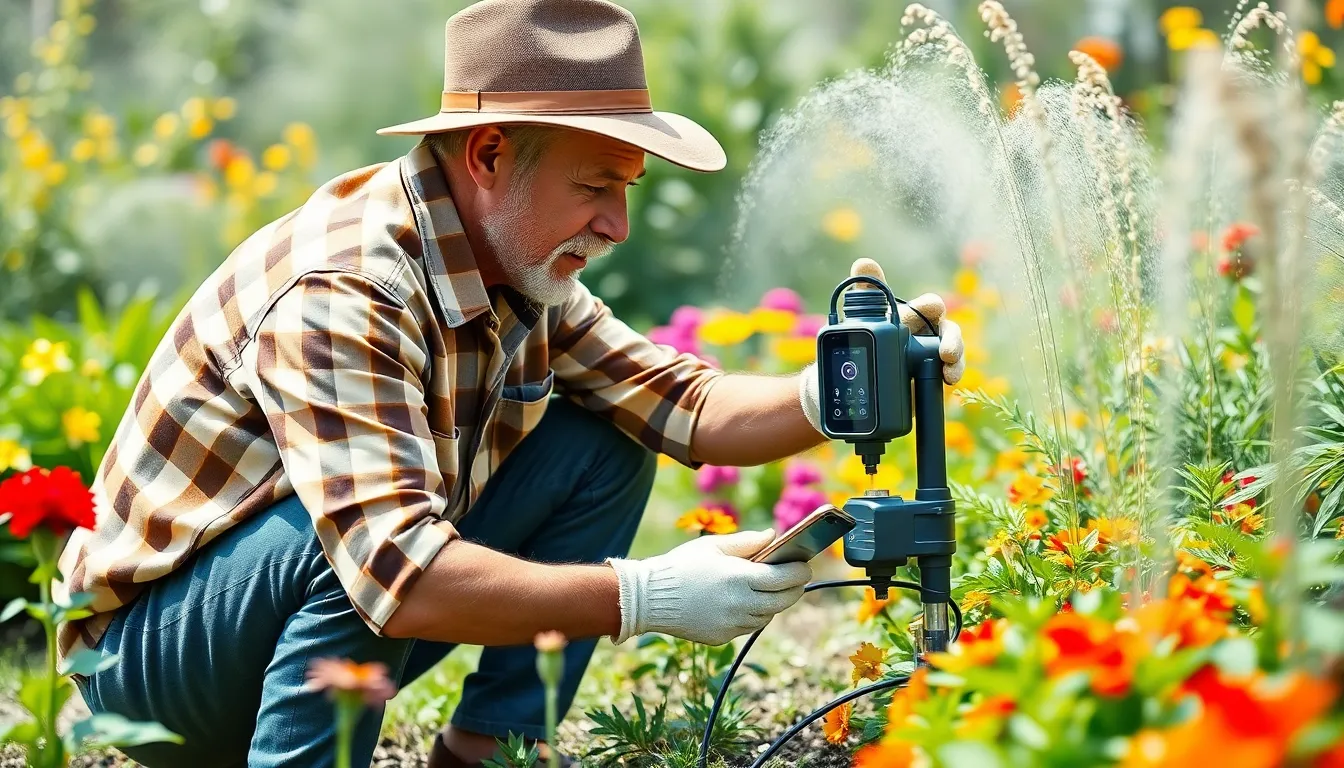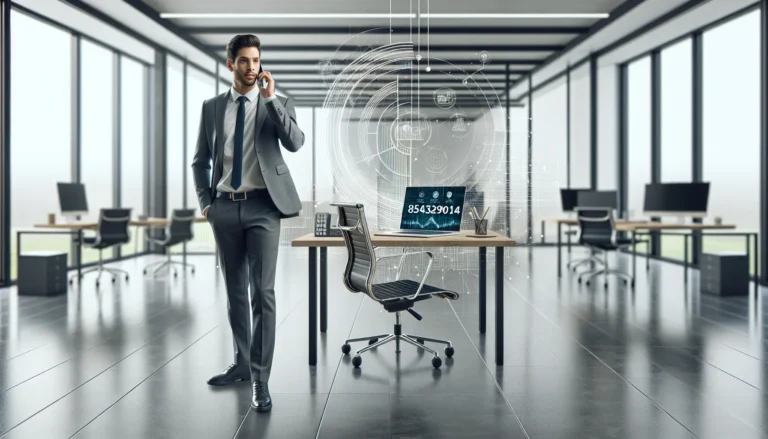In a world where water is more precious than gold, smart irrigation systems are the unsung heroes of sustainable gardening. Picture this: a garden that knows exactly when it needs a drink, without you having to lift a finger—or a hose. These high-tech marvels not only save water but also ensure your plants are thriving like they just returned from a spa day.
Gone are the days of guessing when to water or praying for rain. With smart irrigation, it’s all about efficiency and precision. Imagine your garden getting just the right amount of hydration while you kick back and enjoy a cold beverage. It’s time to embrace technology that works smarter, not harder, and transform your gardening game. After all, who wouldn’t want to be the proud owner of a garden that practically waters itself?
Table of Contents
ToggleOverview Of Smart Irrigation System
Smart irrigation systems utilize technology to optimize water usage in gardening and landscaping. These systems typically integrate sensors, timers, and moisture meters to assess soil conditions. By analyzing real-time data, smart systems determine the exact amount of water needed for plants.
Traditional irrigation methods often lead to overwatering or underwatering. Smart irrigation systems reduce these issues, promoting healthier plant growth. They connect to weather forecasts, adjusting watering schedules based on rainfall and temperature forecasts. This connectivity minimizes water waste while ensuring plants receive adequate hydration.
Cost savings accompany the efficiency of smart irrigation systems. Homeowners frequently experience reduced water bills as these systems tend to use 30-50% less water compared to conventional methods. Environmental benefits also arise, with reduced runoff and decreased groundwater depletion.
Installation of smart irrigation systems varies in complexity. Some homeowners may opt for simple timers that attach to traditional hoses, while others may choose fully automated systems integrated into existing infrastructure. Features like mobile application control enhance user experience, allowing gardeners to manage their systems remotely.
Adopting smart irrigation technology does not only improve efficiency; it enhances gardening enjoyment. Gardeners can spend less time worrying about watering plants and more time enjoying the beauty they create. With these systems, people can contribute to sustainable gardening practices, making a positive impact on the environment.
Benefits Of Smart Irrigation Systems

Smart irrigation systems offer multiple advantages, making them invaluable for sustainable gardening and agriculture. These advanced technologies significantly enhance water management, improve plant health, and lead to substantial cost savings.
Water Conservation
Water conservation represents a top benefit of smart irrigation systems. These systems use sensors to monitor soil moisture levels, ensuring plants receive only the necessary amount of water. Utilizing this precision can reduce water consumption by 30-50% compared to traditional methods. Adjustments based on real-time weather data further minimize waste, as systems can skip watering when rain is forecasted. By optimizing water usage, it promotes sustainability and positively impacts the environment.
Improved Crop Yield
Improved crop yield results from the precise irrigation smart systems provide. Optimal hydration leads to stronger root systems and healthier plants, which directly contributes to increased growth. Accurate watering schedules prevent over-saturation and under-watering, both of which can harm plant development. Additionally, tailored water distribution ensures all plants receive adequate moisture, promoting uniform growth and enhancing overall harvest quality. With higher yield potential, farmers can meet production goals effectively.
Cost Efficiency
Cost efficiency enhances the appeal of smart irrigation systems. Reduced water usage translates to lower utility bills, providing significant savings over time. Users also benefit from decreased labor costs associated with manual watering practices. The initial investment in technology pays off through long-term savings and improved output. Moreover, less water waste contributes to conservation efforts, aligning economic benefits with environmental responsibility. Investing in a smart irrigation system ultimately creates a more financially sound and sustainable gardening practice.
Components Of Smart Irrigation Systems
Smart irrigation systems consist of essential components that work in harmony to optimize water usage. These components include sensors, controllers, and various irrigation methods.
Sensors
Sensors play a crucial role in smart irrigation systems. They monitor soil moisture levels, temperature, and other environmental conditions. By analyzing this data, sensors determine the precise amount of water necessary for optimal plant health. Soil moisture sensors, for instance, provide real-time feedback, allowing the system to adjust watering schedules based on current conditions. With accurate moisture readings, gardeners avoid overwatering and promote healthy plant growth.
Controllers
Controllers act as the brain of smart irrigation systems. These devices facilitate communication between sensors and irrigation equipment. They process data from sensors to create efficient watering schedules. Programmable controllers allow customization based on specific plant needs and weather forecasts. Many controllers enable smartphone connectivity, empowering users to monitor and adjust their irrigation systems remotely. This integration enhances convenience while ensuring efficient water management.
Irrigation Methods
Various irrigation methods enhance the effectiveness of smart irrigation systems. Drip irrigation delivers water directly to the plant roots, minimizing evaporation and runoff. Sprinkler systems, equipped with smart technology, adjust based on weather data and soil conditions. Subsurface irrigation places water underground, reducing evaporation and weeds. By selecting the appropriate irrigation methods, users can maximize water efficiency and promote healthy, vigorous plant growth.
Challenges And Considerations
Smart irrigation systems present several challenges and considerations for potential users. Understanding these aspects is crucial for optimal implementation.
Installation Costs
Installation costs can vary significantly based on system complexity and scale. Homeowners might face initial expenses from $1,500 to $3,000 for residential systems. Costs encompass sensors, controllers, and labor. Selecting a professional installer can add to the overall budget. However, these upfront investments often lead to long-term water savings and increased efficiency.
Maintenance Requirements
Maintenance requirements are essential for ensuring longevity and optimal performance. Regular inspections of sensors and components can help identify issues early. Routine cleaning of drip lines and sprinkler heads prevents clogs, promoting even water distribution. Seasonal adjustments based on weather changes also enhance efficiency. Neglecting these tasks may result in system inefficiencies or reduced plant health.
Technical Knowledge
Technical knowledge significantly influences system effectiveness and user experience. Users might require training to interpret data from sensors properly and adjust settings accordingly. Familiarity with mobile applications for remote management is also beneficial. Individuals lacking technical expertise could face challenges in troubleshooting or optimizing system performance. Investing time in learning about the system greatly enhances its overall functionality.
Smart irrigation systems represent a significant advancement in sustainable gardening practices. By leveraging technology to optimize water usage they not only enhance plant health but also contribute to substantial cost savings. Homeowners can enjoy lush gardens without the burden of excessive water bills or time-consuming manual watering.
As these systems continue to evolve they promise even greater efficiency and ease of use. With the right setup and maintenance gardeners can reap the benefits of improved crop yields and healthier plants. Embracing this innovative approach to irrigation aligns economic advantages with environmental stewardship making it a wise choice for any gardening enthusiast.




